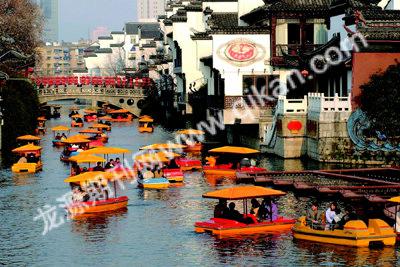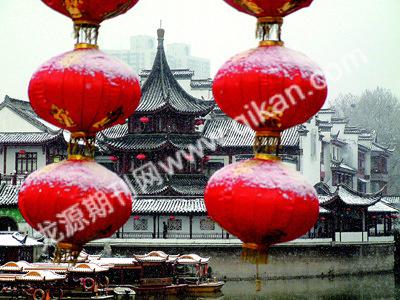In Search of Sound of Oars on the Qinhuai River
2009-06-08WenRui
Wen Rui

My earliest impression of the Qinhuai River came from a poem by Du Mu, a prominent poet of the Tang Dynasty (618-907).
A MOORING ON THE QINHUAI RIVER
Mist veils the cold stream,and moonlight the sand,
As I moor in the shadow of a river-tavern,
Where girls, with no thought of a perished kingdom,
Gaily echo A Song of Courtyard Flowers.
The seven-character quatrain sent my imagination run wild: the night, the mist on the river, the moonlight, the poet, the singing girls in riverside wine shops.
For years, I painted pictures in my mind and the images swirled around the poem. I thought about time flowing relentlessly on the river, about the singing girls and their fates, about the boatmen, merchants, wine sellers who came to the river in search of good fortune, about the extravagant customers who sought wanton pleasure in wine shops, and these svelte pretty women who sold their smiles and songs, the moonlight and willows, the poetry written about such a life in all the past centuries. Sometimes the pictures I painted shifted to details: lanterns, a shop streamer, potted orchids or camellias on the windowsills, a pretty girl leaning on a window of a riverside house, the crystal waters of the river, the oars that go into the water, the ripples that radiate out after the oars touch the water, the moon in the water following the boat, friends taking a boat tour on the river and chatting casually, a tour on the river in winter or summer; scholars and girls.
I had new impressions about the river in my college days. They were from two essays both entitled “Qinhuai River in Sound of Oars and Light Reflections” by the 20th-century scholars Zhu Ziqing and Yu Pingbo. Under their pens, the ancient charms and romances got lost forever. It seemed to me that the two virtuous essayists dislike such a life. They preferred the quiet sound of oars on the river.
It was not until a snowy day in the winter of 2005 that I came to the river. Despite the cold weather, the crowds of visitors milled around on the river. The section of the famous Qinhuai River restored to its ancient fame was only about 100 meters long. There were lanterns casting their soft and quiet light on the water. The charms of the Tang poems that create impressions of the river were out of proportion here. The river felt like a woman sporting all her shiny jewelry. I found myself unable to adjust to the hectic and loud scene. I allowed myself to think that it was all right to have singing girls in wine shops, but the river itself should not be made that gaudy and sumptuous.
I was hugely disappointed. One would certainly be utterly disillusioned if one adheres to legends and poems about the river. The 21st centurys commercial atmosphere turned the river into a shop; neon lights, milling crowds speaking all kinds of dialects annihilated the rivers peaceful rhythms. Probably the river should withdraw itself into history and stay untouchable in poetry. I tried in vain to find the boat described in the essays by Zhu Ziqing and Yu Pingbo. Finally I gave up the idea of taking a boat tour. Such a journey would be pointless as I would not find the quiet sound of oars and the charms poeticized by Du Mu.

But the Qinhuai River is not to blame. It carries the heavy burden of history in its bosom and time still vanishes on the river in the same way. The river has long adjusted itself to the vicissitudes of man: passion, love, moonscape, breezes, swords, dynasties, farewell, reunion, willows in spring breeze, plum blossoms withering in snow. The river reflects the history of the city and people who have come to it to enjoy luxuries and prosperities. It is man who should come back to a life that is more rational. Life goes on, things happen, and we have our own souls to take care of. As we are passing by, we are not in a position to seek anything from the river.
Thinking all this, I believe I can understand the Qinhuai River better and my heart becomes as quiet as the waters of the river. Now I can hear the serene sound of the oar going through the river that flows through my soul.□
